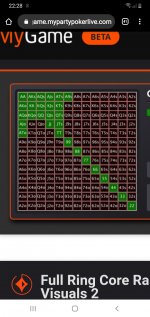Don't apologize for multi-quoting, it makes me (at least) happy to see! Much easier on the eye than ten individual quoted posts from one member... :biggrin: :icon_thum
Don't forget that if you multi-quote ten posts,
and want to reply to them individually, you can type in between each quoted post too. Your text doesn't have to exclusively be after the quotes, it can be between them as well..
~~~~~~
Now, on to your question...
Similarly to '
what to study first',
I can't tell you whether your recent results were down to a lucky run or astute play...
The reason (as poker players) we don't focus on
results is because we can
play badly and win, and equally,
play great and lose.
The only way to determine whether we have made good decisions (i.e. 'played well') is through analysis, which is one of the reasons it's important and beneficial to track and review our play.
My intuition tells me that your good results are due to you boldly playing your heart out while applying the principles you've been studying, but what do I have to go on beyond my gut?

The more consistently you achieve good results, the less likely it is purely down to chance.
Keep studying, keep practicing (what you learn while studying) at the felt and keep analysing your play after the fact.
From what I've read, I don't think you're arrogant about improving rapidly... Probably just a quick learner and transferring knowledge & skills from your degrees and life experience to poker.
While you keep chalking up more wins and good results, my advice to you now is to be disciplined with your BRM (
Bank
Roll
Management) and to just keep building...
We get good runs and bad runs, the important thing is not to get too carried away with either and to stay focused on
that which we have control.
I'm very pleased to read of your triumphs and look forward to reading about many more in future! :congrats:
Regards.
~EDIT:- Who do you have to prove 'not being an idiot' to? :wink:










